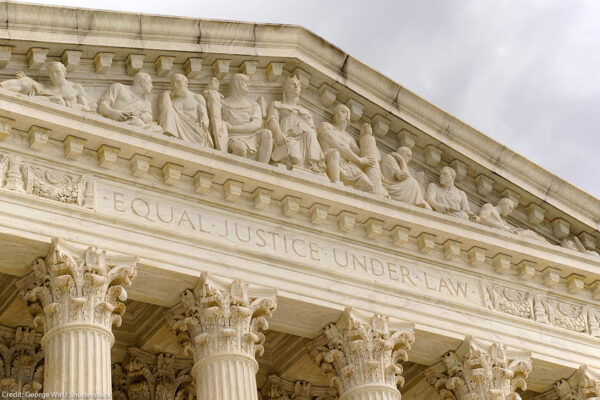Criminal Law Reform
Featured
Arizona
Oct 2023

Criminal Law Reform
Racial Justice
Fund for Empowerment v. Phoenix, City of
Fund for Empowerment is a challenge to the City of Phoenix’s practice of conducting sweeps of encampments without notice, issuing citations to unsheltered people for camping and sleeping on public property when they have no place else to go, and confiscating and destroying their property without notice or process.
U.S. Supreme Court
Sep 2023

Criminal Law Reform
McElrath v. Georgia
Does the Double Jeopardy Clause bar an appellate court from reviewing and setting aside a jury’s verdicts of acquittal on the ground that the verdict is inconsistent with the jury’s verdict on other charges?
U.S. Supreme Court
Jun 2023

Criminal Law Reform
Pulsifer v. United States
This case involves the interpretation of a federal law that allows defendants to avoid mandatory minimum sentences for certain nonviolent drug crimes, allowing judges to impose sentences tailored to their individual circumstances.
Texas
Jul 2021

Criminal Law Reform
Prisoners' Rights
Sanchez et al v. Dallas County Sheriff et al
Decarceration has always been an emergency, a life and death proposition, but COVID-19 makes this effort intensely urgent. The ACLU has been working with our partners to litigate for the rights of those who are incarcerated and cannot protect themselves because of the policies of the institutions in which they are jailed.
All Cases
133 Criminal Law Reform Cases

Mississippi Supreme Court
May 2024
Criminal Law Reform
Love v. State
This case in the Mississippi Supreme Court is a post-conviction appeal of a pro se defendant, Mr. Soweto Love, who argued that his guilty plea was not entered knowingly, voluntarily, and intelligently. The ACLU’s State Supreme Court Initiative, alongside the ACLU of Mississippi, filed an amicus brief arguing that the law is on Mr. Love’s side, but urging the Court to exercise its discretion to inform Mr. Love that a win could resuscitate his charge and expose him to longer sentences. Consistent with the ACLU amicus brief, the Mississippi Supreme Court held that the trial court had plainly erred by misinforming Mr. Love that his applicable mandatory minimum was one year of imprisonment on each count to which he had pled guilty, when in in fact the mandatory minimum sentence was five years’ imprisonment on each count. The Court remanded Mr. Love’s case to the trial court for an evidentiary hearing.
Explore case
Mississippi Supreme Court
May 2024

Criminal Law Reform
Love v. State
This case in the Mississippi Supreme Court is a post-conviction appeal of a pro se defendant, Mr. Soweto Love, who argued that his guilty plea was not entered knowingly, voluntarily, and intelligently. The ACLU’s State Supreme Court Initiative, alongside the ACLU of Mississippi, filed an amicus brief arguing that the law is on Mr. Love’s side, but urging the Court to exercise its discretion to inform Mr. Love that a win could resuscitate his charge and expose him to longer sentences. Consistent with the ACLU amicus brief, the Mississippi Supreme Court held that the trial court had plainly erred by misinforming Mr. Love that his applicable mandatory minimum was one year of imprisonment on each count to which he had pled guilty, when in in fact the mandatory minimum sentence was five years’ imprisonment on each count. The Court remanded Mr. Love’s case to the trial court for an evidentiary hearing.

Washington, D.C.
May 2024
Criminal Law Reform
Disability Rights
Mathis v. United States Parole Commission
This federal class-action lawsuit alleges that the federal government’s post-conviction supervision system in Washington, D.C., violates Section 504 of the Rehabilitation Act by systematically failing to accommodate the needs of people with disabilities on supervision.
Explore case
Washington, D.C.
May 2024

Criminal Law Reform
Disability Rights
Mathis v. United States Parole Commission
This federal class-action lawsuit alleges that the federal government’s post-conviction supervision system in Washington, D.C., violates Section 504 of the Rehabilitation Act by systematically failing to accommodate the needs of people with disabilities on supervision.

U.S. Supreme Court
Apr 2024
Criminal Law Reform
Free Speech
Trump v. United States
Explore case
U.S. Supreme Court
Apr 2024

Criminal Law Reform
Free Speech
Trump v. United States

U.S. Supreme Court
Apr 2024
Criminal Law Reform
Disability Rights
City of Grants Pass v. Johnson
Whether punishing unhoused people who for sleeping in public when they have no access to shelter violates the Eighth Amendment’s prohibition on cruel and unusual punishment.
Explore case
U.S. Supreme Court
Apr 2024

Criminal Law Reform
Disability Rights
City of Grants Pass v. Johnson
Whether punishing unhoused people who for sleeping in public when they have no access to shelter violates the Eighth Amendment’s prohibition on cruel and unusual punishment.

Virginia Supreme Court
Feb 2024
Criminal Law Reform
Board of Supervisors of Fairfax County v. Leach-Lewis
In this case, the Virginia Supreme Court is considering whether the U.S. Constitution and/or the Virginia Constitution require the exclusionary rule—which protects people from unconstitutional searches and seizures—to apply in civil zoning enforcement actions. The Institute for Justice, along with The ACLU of Virginia and the Speech, Privacy, and Technology Project and the State Supreme Court Initiative at the ACLU, submitted an amicus brief arguing that the exclusionary rule should apply in civil actions to protect Virginians’ search and seizure rights.
Explore case
Virginia Supreme Court
Feb 2024

Criminal Law Reform
Board of Supervisors of Fairfax County v. Leach-Lewis
In this case, the Virginia Supreme Court is considering whether the U.S. Constitution and/or the Virginia Constitution require the exclusionary rule—which protects people from unconstitutional searches and seizures—to apply in civil zoning enforcement actions. The Institute for Justice, along with The ACLU of Virginia and the Speech, Privacy, and Technology Project and the State Supreme Court Initiative at the ACLU, submitted an amicus brief arguing that the exclusionary rule should apply in civil actions to protect Virginians’ search and seizure rights.
